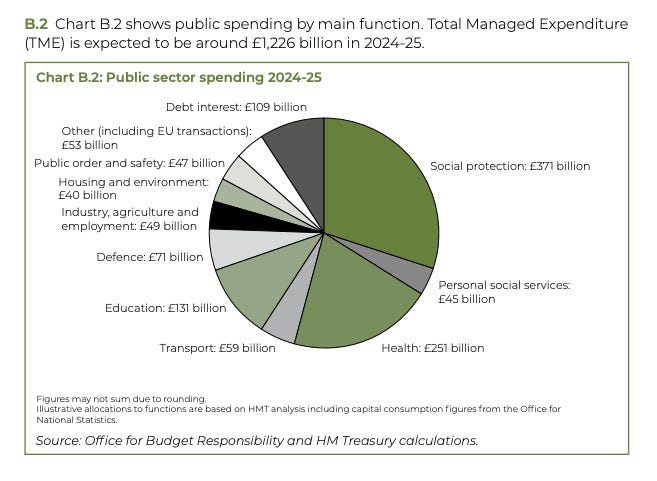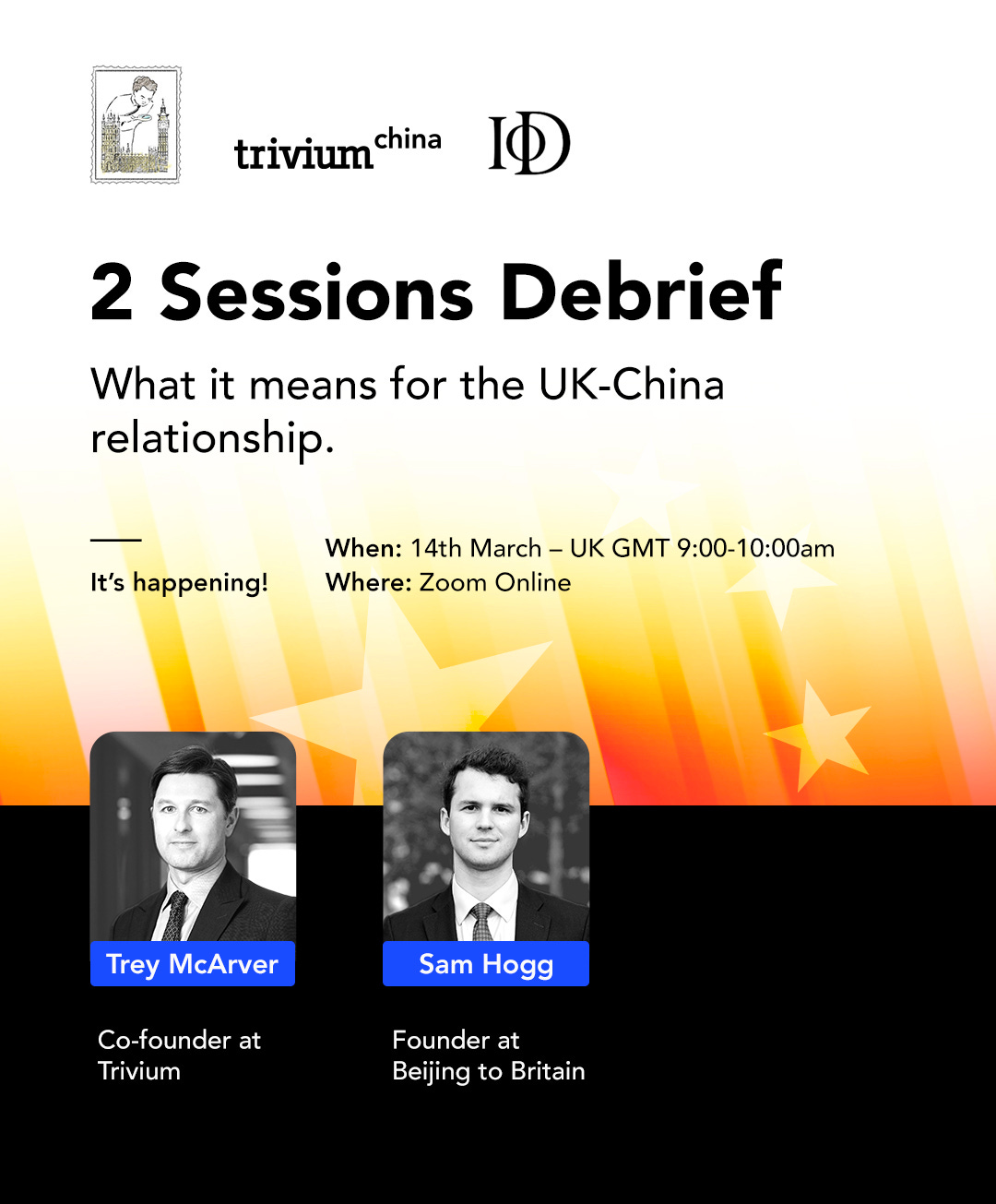Defence Budget, Cameron on China, critical minerals
The Foreign Secretary discusses China, and Monzo gets some more Chinese funding
Hello,
“A true thing, poorly expressed, is a lie.“
I’ve recently found myself re-reading some of Cicero’s work, thanks to a small bookshop in Devon selling what I reckon is probably a 5th-hand copy of his speeches for a pound. Away from the usual sharp analysis of his excellent rhetoric, what stands out from these speeches to me is the statesman’s ability to weave his policy ideas for the preservation and future of Rome with the city’s past. He does this by frequently recalling foundational myths from the city’s history and putting the key lessons from them into a contemporary context, often utilising them to appeal to senators’ shared values and conscience as a means of protecting the Republic.
It seems to me that in this age of increasing national angst and tightly produced social media clips, many leaders and governments have lost the art of storytelling. This matters because stories are the abstract, intangible DNA that binds society, allows you to convey critical messages, and projects your values to the outside world. They are part of what makes us humans. Australia’s First Nations people have been using stories, or Songlines, to pass down warnings, advice and ideas for tens of thousands of years.
Two events simultaneously took place in the UK-China bilateral this week. Both presented their participants a chance to tell a story of their nation: who they are, what they are trying to do, and how they want to do it. So what did they want us to learn?
In the United Kingdom, Chancellor Jeremy Hunt presented the Budget. Setting the fiscal landscape ahead of a looming General Election, Hunt sought to tell a story of a Conservative Government fighting back successfully against economic headwinds out of its control. Unfortunately, the data presented seems to contradict the claim at the heart of this story. And although the Government tried to convey it was taking defence issues seriously in what it has called a “Pre-War World”, the budget failed to reflect this, with little to celebrate for the Ministry of Defence or the Intelligence Establishment.
In China, the Two Sessions took place. President Xi’s government sought to calm fears and concerns over the country’s economy and internal direction. Again, the massaged data failed to convince outside observers of the credibility of this story. Instead, the decision not to allow Premier Li Qiang to give a press briefing for the first time in three decades undermined most of the topline points made by Xi.
On the topic of the Two Sessions: we’re pleased to holding a free joint online debrief with our partners at Trivium next week. What happened, why should you care, and what should British politicos and CEOs make of it?
- Sam Hogg, Editor
In this week’s briefing, we examine:
The Budget: what it means for the economy, defence and R&D concering China
The Scottish Government’s new strategy paper, a case for independence and where it sees itself in the world
Critical minerals and the British Government
Imperial and China research
Diplomacy Tracker
Politics

The Budget drew Westminster’s attention and ire. Chancellor Jeremy Hunt set out his party’s plans to shepherd the British economy to some degree of normality before the General Election. The culmination of hundreds of hours of work and internal and external lobbying, the key areas raised or ignored for those interested in the UK-China bilateral are as follows:
The economy: Funnily enough, one area of similarity between the UK and China is that their populations don’t appear to have a great deal of confidence in their respective economies. Consumer spending is not looking rosy in either country.
Foreign aid: Despite a promise that the UK would return to spending 0.7% on ODA “when fiscal circumstances allow,” the Government once again failed to do so. In fact, foreign aid was not mentioned at all in the accompanying document.
Defence: The last few Budgets have seen repeated lobbying from Defence Secretaries for more funding. Former Defence Secretary Ben Wallace (who leaves Parliament at the next election) has been particularly vocal, and his successor Grant Shapps delivered a major speech on how dangerous the world currently is in January. Despite this, the Budget set aside no meaningful increase in funding for defence, much to the frustration of analysts. Unusually, two senior serving Ministers publicly criticised the Budget’s defence spend. Indo-Pacific Minister Anne-Marie Trevelyan, a foreign office minister and former defence minister, and Tom Tugendhat, the security minister and an experienced soldier, said in a joint article titled “is 2% enough?” that “It's clear to us that the UK needs to lead the way in increasing our own domestic defence and security spending commitments to 2.5% and beyond”. They continued “China announced this week that it was increasing its defence spending by another 7.2% this year, taking it to $230 billion. That’s more than twice what it was a decade ago…A conflict around Taiwan could destroy $2.6 trillion of trade.”
The Defence Select Committee was furious: Chair Jeremy Quin MP said “The Defence Secretary has referred to us being in a “Pre-War” state. This does not appear to be reflected in his Department’s Budget allocation. The Select Committee is keen to meet the Secretary of State urgently on the Department’s finances and how it will meet the challenges set out in our recent report “Ready for War?”
Intelligence: Bad news for MI5, MI6 and GCHQ, which look to be getting a cut to their budgets
R&D: Readers may recall that as part of its plan to become a ‘Science Superpower’, in turn hopefully gaining more space ahead of China’s own efforts in areas like AI and Quantum technology, the UK has been keen to invest in its science research and development. The Budget included “£14 million to boost the UK’s public sector research and innovation infrastructure, up to £100 million support for future satellite communications, and £1.6 million to progress the quantum computing mission.”
ESG: Notable catch from the CSRI’s Sam Goodman, who spotted the Government would begin to regulate “providers of Environmental, Social & Governance (ESG) ratings to users within the UK. ESG ratings providers will be brought into the regulatory perimeter of Financial Conduct Authority.” What does that mean in simple terms? If you’re promoting a fund that has ESG credentials, consumers will soon be able to report you to the FCA if they think you are violating your claims. Worth watching closely.




